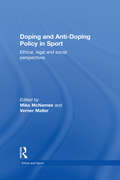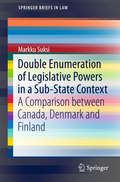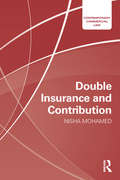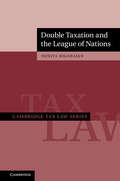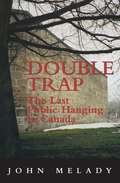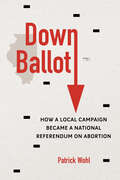- Table View
- List View
Doomed by Cartoon: How Cartoonist Thomas Nast and The New York Times Brought down Boss Tweed and His Ring of Thieves
by John Adler Draper HillThe timely, true story of Thomas Nast, the granddaddy of political satire who destroyed a corrupt regime in 19th century New York City—with cartoons. He was an unethical, bullying, and narcissistic politician; a blow-hard real estate magnate and notorious swindler; a master manipulator who thrived off voter fraud, graft, and the collusion of his right-hand sycophants. This is the 1870s. The legendary William &“Boss&” Tweed, senator and third-largest landowner in New York City, is on a roll. He and his thieving minions have already duped the city out of an estimated two-billion dollars. It wasn&’t going to be easy exposing him. He controlled the press—except for the magazine, Harper&’s Weekly. And Harper&’s had an invaluable weapon against the humorless and seemingly invincible Tweed: Thomas Nast, an influential political cartoonist who, day by day, brought Tweed&’s corruption to light. With pen and ink, and a savage and righteous wink, Thomas Nast was determined to topple an empire. Told through Nast&’s scathing 160-plus serialized cartoons, the remarkable and unbelievable true story of Nast vs. Tweed was not only unprecedented for its day, but it set the tone for the battle between the freedom of the press and political malfeasance that resonates well into the twenty-first century.
Doomed: Sacco, Vanzetti & the End of the American Dream
by Ouisie Shapiro John FlorioFrom John Florio and Emmy Award-winning writer Ouisie Shapiro comes a monumental YA nonfiction book about the heartbreaking case of Sacco and Vanzetti, two Italian immigrants who were wrongfully executed for murder.In the early 1920s, a Red Scare gripped America. Many of those targeted were Italians, Eastern Europeans, and other immigrants.When an armed robbery resulting in the death of two people broke headlines in Massachusetts, Nicola Sacco and Bartolomeo Vanzetti—both Italian immigrants—were quick to be accused.A heated trial ensued, but through it all, the two men maintained their innocence. The controversial case quickly rippled past borders as it became increasingly clear that Sacco and Vanzetti were fated for a death sentence. Protests sprang up around the world to fight for their lives.Learn the tragic history we dare not repeat in Doomed: Sacco, Vanzetti, and the End of the American Dream, an action-packed, fast-paced nonfiction book filled with issues that still resonate today.Praise for Doomed“A riveting true crime story—but who are the criminals? As relevant today as it was a century ago.” - Steve Sheinkin, author of Bomb and Fallout
Doping and Anti-Doping Policy in Sport: Ethical, Legal and Social Perspectives (Ethics and Sport)
by Verner Møller Mike McNameeThe issue of doping has been the most widely discussed problem in sports ethics and is one of the most prominent issues across sports studies, the sports sciences and their constituent disciplines. This book adds uniquely to that catalogue of discourses by focusing on extant anti-doping policy and doping practices from a range of multi-disciplinary perspectives (specifically ethical, legal, and social scientific). With contributions from a world-class team of scholars and legal practitioners from the UK, Europe and North America, the book explores key contemporary issues such as: sports medicine international doping policy the whereabouts system the criminalization of doping privacy rights, gene doping and ethics imperfection in doping test procedures steroid use in the general population. Doping and Anti-Doping Policy in Sport offers an important critique of contemporary anti-doping policy and is essential reading for any advanced student, researcher or policy maker with an interest in this vital issue.
Doping in Non-Olympic Sports: Challenging the Legitimacy of WADA? (Routledge Research in Sport, Culture and Society)
by Lovely DasguptaThis book is the first of its kind to discuss doping within Non-Olympic Sports. Sports like American football, cricket and dance sports have, in recent years, been in the news for doping activities. The scale of the incidents may differ in each of these sports, but they present interesting questions about the legitimacy of the World Anti-Doping Agency (WADA) Code. Doping in Non-Olympic Sports: Challenging the legitimacy of WADA? argues against the International Olympic Committee (IOC)-run regime where WADA Code compliance is used as the only parameter to define an activity as a sport. The book argues that the definition of modern sport is based on certain factors identified through sociological and historical research. These parameters are common across the board and do not distinguish between Olympic and Non-Olympic sports. However, the use of the word Olympic in the Non-Olympic sport terminology subjects such sports to IOC dictates. Consequently, the IOC exploits its monopoly over the word Olympics to insist on WADA Code compliances. The numerous instances of doping, as reported, go on to prove that WADA is turning a blind eye to these Non-Olympic sports. This book is the first to dissect the issue of doping within Non-Olympic sports and questions the very idea of WADA compliance as a condition precedent to defining sports going on to highlight the inbuilt inequity within the existing anti-doping system wherein a private regime is usurping the State’s discretion. The new, cutting edge research book is key reading for academics and researchers in the fields of Coaching, Sport Pharmacology, Sport Medicine, Sports Law, and the related disciplines.
Double Enumeration of Legislative Powers in a Sub-State Context: A Comparison Between Canada, Denmark And Finland (SpringerBriefs in Law)
by Markku SuksiThis book analyses a middle position between single enumerations in a regular federal-like and a regular autonomy-like distribution of legislative powers by examining constitutional legislation in three countries (Canada, Denmark and Finland) that have established separate enumerations for the national level and the sub-state level. The sub-state level consists of provinces in Canada, the Faroe Islands in Denmark and the Åland Islands in Finland. The book provides interpretations of the competence line based on double enumeration between the national parliament and the sub-state entities, where relevant, on the basis of the travaux preparatoires of the fundamental norms on which the arrangements are based, judicial or quasi-judicial resolutions of competence problems, and relevant doctrine and literature.
Double Indemnity
by James M. CainA true crime masterpiece, and highly acclaimed 1940s movie'DOUBLE INDEMNITY is among the finest of all American novels, regardless of genre or style' LA TIMES'Cain is the master' Tom WolfeDOUBLE INDEMNITY is the classic tale of an evil woman motivated by greed who corrupts a weak man motivated by lust.Walter Huff is an insurance investigator like any other until the day he meets the beautiful and dangerous Phyllis Nirdlinger and falls under her spell. Together they plot to kill her husband and split the insurance. It'll be the perfect murder . . .
Double Indemnity
by Robert WhitlowSomeone stands to gain millions of dollars from a hunter&’s accidental death . . . unless that death wasn&’t an accident.Matt and Elena Thompson present the picture of perfection. But their enviable life isn&’t all it seems. Their marriage is on the rocks, and financial disaster looms. Then Matt is killed in a hunting accident, and the questions and accusations begin to mount.Attorney Liz Acosta, newly arrived in the mountains of north Georgia after graduating from law school, plans to get some job experience on her resume before returning home to seek a position with a big-time firm. Intellectual pastor Connor Grantham isn&’t sure that shepherding a rural congregation is what he ultimately wants to do with his life. Drawn to philosophy, theology, and nature, he&’s beginning to feel more at home in north Georgia—especially after he meets the brilliant and energetic Liz.While Liz and Connor spend more time with each other and discover just how compatible two people from wildly different backgrounds can be, they&’re also being drawn into the shadowy world of Matt and Elena Thompson. As the couple&’s marriage counselor, Connor finds himself in the middle of their explosive arguments. As Elena&’s attorney, Liz is caught in the tailspin created by Matt&’s death.Together, Connor and Liz attempt to solve the mystery of what really happened to Matt. If his death is ruled an accident, then the double indemnity clause in his life insurance would go into effect, essentially doubling the payout. But as Liz sorts through the legal paperwork of who stands to gain an immense sum of money from Matt&’s death, Connor is accused of the unthinkable with much more at stake than millions of dollars.Contemporary Christian legal dramaPerfect for fans of John GrishamIncludes discussion questions for book clubs
Double Insurance and Contribution (Contemporary Commercial Law)
by Nisha MohamedDouble insurance is an issue which frequently arises in practice. Dr Nisha Mohamed delves into the problems which arise in double insurance and the attempts to provide a solution to the uncertainty of the law in this area. The book begins with a fascinating look at the history and development of the law of double insurance, outlining how it has developed, and the factors the court may take into account when deciding cases involving double insurance. Attempting to provide a common law solution where no legislation has been enacted, the book covers contemporary instances of double insurance by focusing on: the relevant clauses (rateable proportion, excess, escape and other insurance) the difficulty of the courts in providing clear principles in cases of double insurance attempts to limit or exclude liability by the insurer how the clauses work in practice court decisions in various jurisdictions the Australian position under section 45 of the Insurance Contracts Act 1984 whether the Australian position can be adopted in the United Kingdom This text combines practical experience with academic rigour and will be of significant interest to lawyers, academics and insurance industry professionals alike.
Double Jeopardy: A Novel of Suspense
by William BernhardtHanded a rotten case, a lawyer will risk his life to uncover the truthA young woman is abducted by six men, beaten, raped, and left for dead. She can only identify one of her assailants: Al Moroconi, a tough guy whose links to the attack are only circumstantial. And when Moroconi&’s first lawyer is brutally murdered, the court appoints Travis Byrne, an ex-cop turned attorney, to defend him. In a lifetime of bad breaks, this will prove the worst piece of luck Byrne has ever had. Someone is trying to frame Moroconi, but why? Byrne is determined to answer this question, but doing so will see him threatened, beaten, and framed for murder. And as he attempts to clear his name, Byrne uncovers a sickening secret for which the original crime was only a cover-up. Only the truth can save him, but in a case like this, the truth could cost him his life.
Double Jeopardy: The History, The Law
by George C. Thomas, IIIIn the first book-length book on the subject in over a quarter century, George C. Thomas III advances an integrated theory of double jeopardy law, a theory anchored in historical, doctrinal, and philosophical method. Despite popular belief, double jeopardy has never been a limitation on the legislature. It functions instead to keep prosecutors and judges from imposing more than one criminal judgment for the same offense. Determining when seemingly different offenses constitute the "same offense" is no easy task. Nor is it always easy to determine when a defendant has suffered more than one criminal judgment. Tracing American double jeopardy doctrine back to twelfth century English law, the book develops a jurisprudential account of double jeopardy that recognizes the central role of the legislature in creating criminal law blameworthiness.
Double Life: The Shattering Affair between Chief Judge Sol Wachtler and Socialite Joy Silverman
by Linda WolfeA &“spellbinding&” account of the New York judge who was brought down by prescription drugs, sexual obsession, and a shocking criminal conviction (Ann Rule). He was the top justice of New York&’s highest court. She was a stunning socialite and his wife&’s step-cousin. In 1993 Sol Wachtler was convicted of blackmail and extortion against Joy Silverman, his former mistress. How did a respected jurist and one of the most prominent men in America end up serving time in prison? Linda Wolfe starts at the beginning—from Wachtler&’s modest Brooklyn upbringing through his courtship and marriage to Joan Wolosoff, the only child of a wealthy real estate developer. Joy Fererh was three and a half when her father walked out. When she and Sol met, he was fifty-five and nearing the pinnacle of his legal career. She was a thirtysomething stay-at-home mother who, with Sol&’s help, made a career for herself as a Republican Party fundraiser. They kept their affair a secret—until an explosive mix of sex, power, betrayal, and prescription-drug abuse set the stage for the tabloid headlines of the decade.
Double Paradox
by Andrew WedemanAccording to conventional wisdom, rising corruption reduces economic growth. And yet, between 1978 and 2010, even as officials were looting state coffers, extorting bribes, raking in kickbacks, and scraping off rents at unprecedented rates, the Chinese economy grew at an average annual rate of 9 percent. In Double Paradox, Andrew Wedeman seeks to explain why the Chinese economy performed so well despite widespread corruption at almost kleptocratic levels. Wedeman finds that the Chinese economy was able to survive predatory corruption because corruption did not explode until after economic reforms had unleashed dynamic growth. To a considerable extent corruption was also a by-product of the transfer of undervalued assets from the state to the emerging private and corporate sectors and a scramble to capture the windfall profits created by their transfer. Perhaps most critically, an anti-corruption campaign, however flawed, has proved sufficient to prevent corruption from spiraling out of control. Drawing on more than three decades of data from China-as well as examples of the interplay between corruption and growth in South Korea, Taiwan, Equatorial Guinea, and other nations in Africa and the Caribbean-Wedeman cautions that rapid growth requires not only ongoing and improved anti-corruption efforts but also consolidated and strengthened property rights.
Double Tap
by Steve Martinithe latest book in Martini's Paul Madriani series. Madriani defends an ex-soldier accused of killing the head of a computer security firm. the method of execution -- a double tap -- points to a man with military experience. complicating Madriani's case is the unwillingness of the defendant to talk about his military past.
Double Taxation and the League of Nations (Cambridge Tax Law Series)
by Sunita JogarajanModern-day tax treaties have their foundations in one of the three Model Tax Treaties developed by the League of Nations in 1928. <P><P>Using previously unexplored archival material, Sunita Jogarajan provides the first in-depth examination of the development of the League's Models. This new research provides insights into questions such as the importance of double taxation versus tax evasion; the preference for source-taxation versus residence-taxation; the influence of theory and practice on the League's work; the development of bilateral rather than multilateral treaties; the influence of developing countries on the League's work; the role of Commentary in interpreting model tax treaties; and the influential factors and key individuals involved. A better understanding of the development of the original models will inform and help guide interpretation and reform of modern-day tax treaties. Additionally, this book will be of interest to scholars of international relations and the development of law at international organisations.<P> Fills a gap in the literature on double taxation.<P> The first study of the archival evidence on the establishment of the first model tax treaties dealing with double taxation.<P> Highlights relevant aspects of later tax treaty developments and the current OECD Model.
Double Trap: The Last Public Hanging in Canada
by John MeladyA dozen years before the Black Donnellys were butchered at Lucan, Ontario, another murderous rampage took place a few miles away. On June 6, 1868, three men robbed and killed a rich farmer, his wife, and her unborn child. They concocted an alibi, stuck to it, and almost got off. In fact, two of them did.The third, Nicholas Melady, went to prison and fell in love with a beautiful woman in a nearby cell. There to entrap him, she listened, learned, and led him to the gallows. When he was hanged in Goderich, hundreds watched, but thousands were late for the spectacle. They were bitterly disappointed because they had missed the last public hanging in Canada.
Double Vision: Moral Philosophy and Shakespearean Drama
by Tzachi ZamirHamlet tells Horatio that there are more things in heaven and earth than are dreamt of in his philosophy. In Double Vision, philosopher and literary critic Tzachi Zamir argues that there are more things in Hamlet than are dreamt of--or at least conceded--by most philosophers. Making an original and persuasive case for the philosophical value of literature, Zamir suggests that certain important philosophical insights can be gained only through literature. But such insights cannot be reached if literature is deployed merely as an aesthetic sugaring of a conceptual pill. Philosophical knowledge is not opposed to, but is consonant with, the literariness of literature. By focusing on the experience of reading literature as literature and not philosophy, Zamir sets a theoretical framework for a philosophically oriented literary criticism that will appeal both to philosophers and literary critics. Double Vision is concerned with the philosophical understanding induced by the aesthetic experience of literature. Literary works can function as credible philosophical arguments--not ones in which claims are conclusively demonstrated, but in which claims are made plausible. Such claims, Zamir argues, are embedded within an experiential structure that is itself a crucial dimension of knowing. Developing an account of literature's relation to knowledge, morality, and rhetoric, and advancing philosophical-literary readings of Richard III, Macbeth, Romeo and Juliet, Othello, Antony and Cleopatra, Hamlet, and King Lear, Zamir shows how his approach can open up familiar texts in surprising and rewarding ways.
Doubt in Islamic Law
by Intisar A. RabbThis book considers an important and largely neglected area of Islamic law by exploring how medieval Muslim jurists resolved criminal cases that could not be proven beyond a doubt. Intisar A. Rabb calls into question a controversial popular notion about Islamic law today, which is that Islamic law is a divine legal tradition that has little room for discretion or doubt, particularly in Islamic criminal law. Despite its contemporary popularity, that notion turns out to have been far outside the mainstream of Islamic law for most of its history. Instead of rejecting doubt, medieval Muslim scholars largely embraced it. In fact, they used doubt to enlarge their own power and to construct Islamic criminal law itself. Through a close examination of legal, historical, and theological sources, and a range of illustrative case studies, this book shows that Muslim jurists developed a highly sophisticated and regulated system for dealing with Islam's unique concept of doubt, which evolved from the seventh to the sixteenth century.
Dovey Undaunted: A Black Woman Breaks Barriers in the Law, the Military, and the Ministry
by Tonya BoldenCoretta Scott King Honor–winning author Tonya Bolden chronicles the life of an intrepid lawyer and civil rights pioneer. Dovey Johnson Roundtree was most famous for her successful defense of an indigent Black man accused of the murder of Mary Pinchot Meyer, a prominent white Washington, DC, socialite, in 1965. Despite her triumph in this high-profile case, Roundtree continued to represent the poor and the underserved. She was the first lawyer to bring a bus desegregation case before the Interstate Commerce Commission, clinching the ruling that enabled Robert F. Kennedy to enforce bus integration. She was also among the first Black women to enter the Women’s Army Auxiliary Corps, and was one of the first ordained female ministers in the African Methodist Episcopal Church. Tracing Roundtree’s life from her childhood in Jim Crow North Carolina through her adulthood, Tonya Bolden illuminates a little-known figure in American history who believed the law should serve the people, and places her firmly in the context of twentieth-century civil rights and African American culture.
Down Ballot: How a Local Campaign Became a National Referendum on Abortion
by Patrick WohlWhen an obscure primary election met the culture wars In 1990, a suburban Chicago race for the Republican Party nomination for state representative unexpectedly became a national proxy battle over abortion in the United States. But the hard-fought primary also illustrated the overlooked importance of down-ballot contests in America’s culture wars. Patrick Wohl offers the dramatic account of a rollercoaster campaign that, after attracting political celebrities and a media circus, came down to thirty-one votes, a coin toss to determine the winner, and a recount fight that set a precedent for how to count dimpled chads. As the story unfolds, Wohl provides a rare nuts-and-bolts look at an election for state office from its first days through the Illinois Supreme Court decision that decided the winner--and set the stage for a decisive 1992 rematch. A compelling political page-turner, Down Ballot takes readers behind the scenes of a legendary Illinois election.
Down for the Count: Dirty Elections and the Rotten History of Democracy in America
by Andrew GumbelThe updated edition of Steal This Vote—a rollicking history of US voter suppression and fraud from Jacksonian democracy to Citizens United and beyond. In Down for the Count, award-winning journalist Andrew Gumbel explores the tawdry history of elections in the United States. From Jim Crow to Tammany Hall to the Bush v. Gore Florida recount, it is a chronicle of votes bought, stolen, suppressed, lost, miscounted, thrown into rivers, and litigated up to the Supreme Court. Gumbel then uses this history to explain why America is now experiencing the biggest backslide in voting rights in more than a century. First published in 2005 as Steal This Vote, this thoroughly revised and updated edition reveals why America faces so much trouble running clean, transparent elections. And it demonstrates how the partisan battles now raging over voter IDs, campaign spending, and minority voting rights fit into a long, largely unspoken tradition of hostility to the very notion of representative democracy. Interviewing Democrats, Republicans, and a range of voting rights activists, Gumbel offers an engaging and accessible analysis of how our democratic integrity is so often corrupted by racism, money, and power. In an age of high-stakes electoral combat, billionaire-backed candidacies, and bottom-of-the-barrel campaigning, this book is more important than ever. &“In a riveting and frightening account, Gumbel . . . traces election fraud in America from the 18th century to the present . . . [the issues he] so winningly addresses are crucial to the future of democracy.&” —Publishers Weekly, on Steal This Vote
Down in the Flood: A Novel (Danny Chaisson Series)
by Kenneth AbelAll the top crime writers agree that Kenneth Abel is a spectacular writer: "A gripper all the way," says Elmore Leonard. "A stunning achievement," declares James Lee Burke. "Brilliant," says Robert B. Parker. And now with Down in the Flood, former New Orleans prosecutor Danny Chaisson is back in a third electrifying thriller.Danny Chaisson's latest case is bid-rigging. But as his investigation proceeds, a gathering storm named Katrina blasts his world apart.Surrounded by death and the destruction of the city he loves, Danny searches for one man who'd trusted Chaisson to guard his identity when he agreed to testify before a federal grand jury investigating corruption in the city's construction industry. But someone has leaked the identity of this crucial witness, and as the city begins to empty before the approaching storm, Danny learns that a pair of corrupt policemen hired by the wealthy defendants in the case have begun stalking his client.Cut off from escape, and unsure whom he can trust, Chaisson's client has gone into hiding in the city's Ninth Ward, where he grew up. Now Danny must race against time, a pair of relentless professional killers, and the rising flood waters to save the man who'd counted on him.But can Danny save one man as a whole city dies?
Downfall: The Demise of a President and His Party
by Andrew HackerTake a tour through the elections since 2016 and the Republican Party&’s strongest stances to understand the impending defeat of Donald Trump in the 2020 Presidential election. Downfall does not offer a prediction or wishful thinking—it affirms a certainty. Veteran political scientist Andrew Hacker&’s vast array of evidence points to the conclusion that Donald Trump will not be reelected, regardless of which Democratic candidate opposes him. Based on a close analysis of midterm and special elections, Hacker has found that Trump&’s so-called base is shrinking and that a strong majority of voting Americans want Trump out of office. Alongside comments from Republican Party members on why they stand with their party, Hacker autopsies their most steadfast viewpoints to illustrate from where these opinions stem and why Trump supporters provide him with votes. This includes an examination of Republican positions on: Gun controlAbortion and women&’s rightsSexism and gender disparitiesRacism and affirmative actionLGBTQ rightsClimate Change And more Both a look back at the years since Trump&’s election and a glimpse into what lies ahead for politics, Downfall provides an optimistic outlook that the most divisive leader in the US&’s history will join the ranks of one-term presidents.
Doña Perpetua: El poder y la opulencia de Elba Esther Gordillo
by Arturo Cano Alberto AguirreNuevas revelaciones sobre el polémico caso de Elba Esther Gordillo. Las llamadas de dos secretarios de Estado, que la invitaban a compartir el pan y la sal, hicieron que Elba Esther Gordillo cambiara su itinerario. En lugar de volar a Guadalajara, donde la esperaba la cúpula de su "república romana", su avión aterrizó en Toluca. Ahí fue detenida. Los cargos: lavado de dinero y delincuencia organizada. Las autoridades dieron a conocer la lista de sus mansiones, de las exclusivas tiendas donde se vestía con cargo a las cuotas de los maestros y de sus millonarias transferencias bancarias. Muchos de esos datos aparecían ya en este libro, publicado originalmente en 2008, y que hoy se presenta en una edición actualizada. Desde su aparición, Doña Perpetua se convirtió en un texto de referencia, pues se trata de la biografía más completa de un personaje que influyó en la política nacional a lo largo de poco más de cuatro sexenios. Empeñado en la restauración del viejo presidencialismo, el gobierno de Enrique Peña Nieto -beneficiario de la maquinaria electoral del magisterio- lanzó una advertencia a otros actores por medio de la detención de Elba Esther Gordillo, la cabeza más impresentable de los "poderes fácticos". La llegada de la Maestra al poder se dio gracias a
Dr. Alan R. Moritz and Forensic Pathology: Tales That Dead Men Tell
by Rob MoritzForensic science has become a mainstay of popular culture on television, in movies, books, and podcasts. Dr. Alan R. Moritz (1899-1986) was a highly influential figure in the development of the field of forensic science as we know it today.Dr. Alan R. Moritz and Forensic Pathology: Tales that Dead Men Tell, written by Dr. Moritz’s journalist grandson Rob Moritz, recounts his life and career from personal papers and correspondence, interviews, newspaper accounts and other sources, including archived materials from Harvard Medical School, the Rockefeller Foundation, Case Western Reserve University and the University Hospitals of Cleveland. Chapters chronicle more than a half-century of ground-breaking research and high-profile investigations, including some of the 20th century’s most infamous cases. This includes the assassination of President John F. Kennedy, the Sam Shepherd case, the Cocoanut Grove nightclub fire, the Attica prison riots and the Texas Tower sniper, as well as his contributions to the well-known Nutshell Studies of Unexplained Death. Dr. Moritz, the inspiration for the first on-screen forensic scientist, is credited with being one of the most prominent pioneers of the last century, helping to move forensic medicine from the political jurisdiction of untrained local coroners to a respected scientific discipline that fascinates the public.The book also details Dr. Moritz’s travels, during which he experienced some of society’s darkest chapters. This includes an infamous lynching during the “Red Summer” of 1919, the rise of Nazi Germany and the degradation of apartheid in South Africa, all of which influenced and shaped his worldview. Highlights of Dr. Moritz’s work, recounted in detail, include career stops at Case Western Reserve University in Cleveland and Harvard Medical School in Boston. Coverage details his most salient and well-known research—as well as insightful anecdotes and stories that demonstrate Dr. Moritz’s character and the development and evolution of his scientific views over the years.This book: Profiles the life of a well-known and impactful figure in the advancement of forensic pathology’s public perception and practices in the United States. Provides background on Dr. Moritz’s seminal work, the article Classical Mistakes in Forensic Pathology Is of interest to medical practitioners, history of science buffs, and forensic practitioners interested in the early history and development of forensic pathology as a discipline Dr. Alan R. Moritz and Forensic Pathology fills in a missing chapter on the life, research, and lasting legacy of Dr. Moritz, providing insight into the development of modern forensic pathology practice by examining the momentous contributions and character of one of its true pioneers.
Dr. Bot: Why Doctors Can Fail Us—and How AI Could Save Lives
by Charlotte BleaseHow does AI compare to a doctor when it comes to saving lives? Doctors are under-resourced and face unprecedented levels of stress, with rising patient numbers and ever developing medical knowledge. But at the same time, they are all too human, prone to racial, class and social biases that affect the care patients receive. Can we improve patient experience and alleviate the burdens of doctors at the same time? In this groundbreaking study, Charlotte Blease reveals how AI, if handled with care, could emerge as the most reliable physician in history. Drawing on interviews with authorities in AI, doctors and patients, Blease shows how technology – despite some resistance – is already making a difference. From diagnosis and second opinions to treatment and aftercare, AI has the potential to revolutionise our healthcare.


